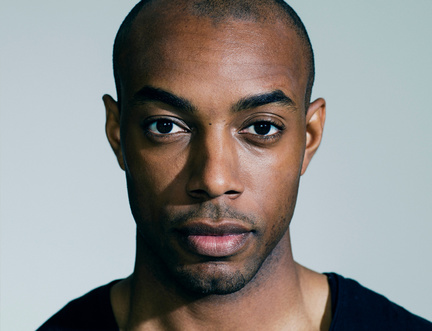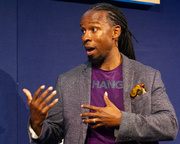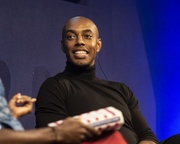More articles Sunday 11 August 2019 2:00pm
The best revenge for oppression is to live life with freedom says Casey Gerald

“I was a big ‘cause’ person for a very long time. I thought you were supposed to devote your life to causes at all costs, and if your friends couldn’t get with the programme then they just had to be casualties.” Writer Casey Gerald sat down to discuss his new book There Will Be No Miracles Here, with his close friend and leading figure in the Black Lives Matter movement, DeRay McKesson, at the Edinburgh International Book Festival yesterday.
“We’ve been throwing generation after generation after generation of brilliant and beautiful black people at the challenge of trying to make America a nobler country, and I don’t want to lose anymore people to symbolhood”, said Casey Gerard, discussing symbolism, making room on the buffet table of life, and the art of living despite struggle.
Gerald found the inspiration for the title of his book from a piece of art shared by Glaswegian artist Nathan Coley. It talked about a case of mass hysteria in French peasants, that saw them stop work to celebrate miracles they had witnessed. In response to this, the authorities went to the King of France. The King’s solution was to have a sign placed in the village square that said: “There will be no miracles here by order of the King”.
This story became very relevant to Gerald when he went to a dinner with President George W Bush and realised that the “Kings are still saying the same thing”.
Gerald’s friendship with Mckesson and other activists helped him realise that fighting for a cause can come at a very real cost.
“I understood. I supported the cause and I didn’t have any interest of him dying for any cause. I wanted him to be alive. I wanted to be able to talk to him. I wanted to be able to go to dinner with him. There was no cause that justified in my eyes, me losing somebody that I loved and perhaps you say that’s selfish. Perhaps you’ll say that the world cannot move forward without sacrifices, but I think the time has long passed.
“While some people look at us and say these are the new voices or whatever, we are deeply grounded in all of the people who paid such an enormous price to make it possible for us to write a book or to sit here as free black people in Edinburgh and talk about these books without any threat of violence or censure or whatever.”
Gerard said he understands the need for revolt having grown up as an underprivileged gay black man in Dallas, but believes that the best revenge for oppression is to live life with freedom. He argued that instead of filling the "buffet table of life" with strategies which black people have employed to survive, such as assimilation and respectability, that instead room should be made for other things.
“All I’m saying is, let’s make a little room on the buffet table for something other than these things. People have to decide, what are you going to put on your plate today? You might put a little protest on your plate, or a lot of protest. Or you might go Keto and do protest for a whole decade. But I want every black child to know, my fourteen year old niece, my seven year old cousin. I want every black child to know there is a buffet. You can decide, you make up your own plate.
“I think it’s incredibly hopeful if America never gets better, there are more days that I can spend with you, that children can spend with Fathers, that Mothers can spend with sons. Even if we die tomorrow, if we just get today to love each other and be beautiful with each other and have some pie and have a good laugh, and listen to some good music and read a good book.”
- 2026 Festival:
- 15-30 August
Latest News
 Major new partnership with Celtic Connections
Major new partnership with Celtic Connections





